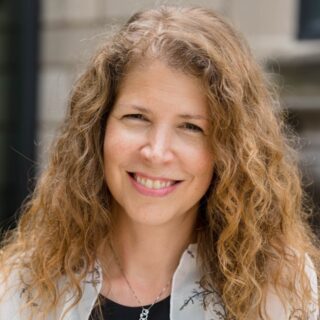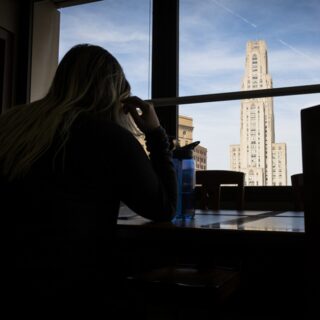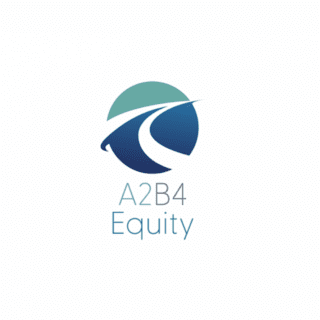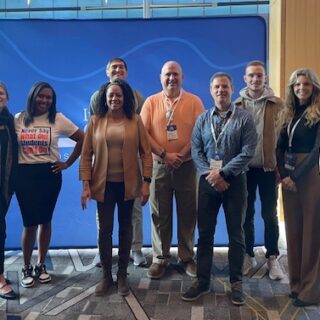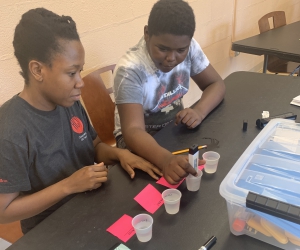
Environmental Social Justice Summer Program Connects Math Education to Real-World
While their friends were enjoying summer days at the pool, a small group of local middle school students were testing samples of the pool water—and other water sources from the environment, like tap water and bottled water—for bacteria and lead.
The cohort of 12 students who attend Pittsburgh Public Schools University Prep Middle School and/or reside in the Hill District participated in an environmental social justice math project-based unit that explored water quality in Pittsburgh.
The program was offered this past summer at the Pitt School of Education through the Center for Urban Education’s (CUE) Ready to Learn (RTL) program after receiving a Chan Zuckerberg grant earlier this year.
Under the direction of CUE Associate Director of Strategic Programming and Initiatives, Dr. Kenny Donaldson, and RTL Program Manager Cassandra Brentley, the middle school students met with Heinz Fellows who served as math mentors at the Jeron X Grayson Center over the course of six weeks. Pitt Education mathematics education assistant professor, Kari Kokka, designed the curriculum.
“The students had a great desire to learn and really rose to the occasion during the student exhibition,” said Brentley. “They were super engaged and showed up every week during their summer when they could’ve done other things.”
RTL is a research-practice partnership that supports personalized learning through tutoring and mentoring while providing middle school students with experiences to support their academic improvement in mathematics and social skill development.
The culmination of their hard work and dedication was the Summer Student Exhibition. The students presented in small groups to community members, CUE faculty, staff, and students, and their parents. Representing responsibility with action and civic engagement, the students’ work connected to Flint, Mich. and water crises in third-world countries.
Presentation topics included “Why is There Lead and Why it’s Important” and “Harmful Bacteria in Water and How is It Treated?”
“You could see the confidence in each and every student,” said Brentley. “When students are given opportunities for engaging academic enrichment, the possibilities are limitless in terms of what they can achieve.”
Another element of the RTL program’s math tutoring is the use of a cutting-edge app.The overarching goal is to develop scalable learning personalization by integrating the strengths of human-mediated and computer-mediated techniques to develop benefits for adapting to the cognitive/content conditions and social-motivational conditions.
The University of Pittsburgh has been collaborating with Carnegie Mellon University to develop the PL^2 app which allows mentors to track and support student goals and progress in conjunction with curriculum, (or more specifically in this particular case, the Mathia program that is used as a study tool).
In addition to utilizing the app to set goals with her students, Heinz Fellow and RTL mentor Imani LaGrone also participated in the development of the app. She met regularly with the PL^2 developers at CMU in an effort to shape the app to fit the ever-changing needs of a mentor-mentee relationship and math tutoring.
“I learned how to be more adaptable when working and learning with youth,” LaGrone said of her experience using the app. “I initially wanted to teach them in ways that I understood, but I learned after listening to them that I needed to reframe things to help students better understand.”
The vision for the Ready to Learn program is that it might serve as a model that other out of school time programs can use to support students’ math learning. With the addition of the PL^2 app people who may not be trained math educators, like parents or mentors, will now have resources available to empower them to better support the students’ math learning. The independent self-directed learning is meant to foster the growth mindset, helping students to be comfortable with being willing to fail and to go through the “productive struggle” in order to build through it for a more vigorous learning space.
“The [RTL] program not only works to increase math competencies but also emphasizes the importance of relationships and holding youth accountable for their learning,” said LaGrone, “If those themes were the emphasis of all educational spaces, we would see a drastic difference in the outcomes of education in all schools and particularly in urban school settings.”
RTL will begin its next session with Westinghouse Academy and University Preparatory School at Margaret Milliones middle school students in the fall for eight weeks, from September to November.

